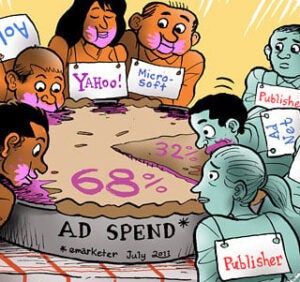 “Data-Driven Thinking” is written by members of the media community and contains fresh ideas on the digital revolution in media.
“Data-Driven Thinking” is written by members of the media community and contains fresh ideas on the digital revolution in media.
Today’s column is written by Corey Ferengul, board member at Hyde Park Angels.
Welcome to 2019. Every ad tech company seems to be for sale and, unfortunately, most efforts will fail.
While ad tech has gotten a good deal of bad press and isn’t viewed as a sexy investment, much of the failure is actually self-inflicted.
Over the past five years, I was CEO of two ad tech companies – Undertone and Magnetic – and successfully sold both. I’ve also led the acquisition of companies in the space, seen pitches for dozens of others and advised many more, either on an exit or strategy.
Based on my experience, I can point to three of the biggest reasons for a failure to exit.
No differentiation
The biggest problem, by far, is very clear and pervasive across the space: a lack of clear, defensible differentiation.
Most companies are not honest with themselves about differentiation; just because a company has technology does not mean it is unique. This creates a vicious cycle: Undifferentiated companies create market confusion, leading marketers and agencies to test multiple vendors, which helps keep those companies in business and tell stories about some market success.
Many other companies differentiate by offering a breadth of capability, which is just as big of a problem. A company must be focused on solving a specific problem in a unique way, which delivers value for its target customer.
When the offering is truly differentiated, it shows. It may be through performance, unique access to consumers, unique placement or some other value that is evident for the customer. Ad tech CEOs must ensure the company is differentiated. If the answer is, “We look like everyone” or “We can’t figure it out,” then it’s time to revisit their strategy.
AdExchanger Daily
Get our editors’ roundup delivered to your inbox every weekday.
Daily Roundup
Lack of understanding of what motivates potential acquirers
Most companies focus on their own strategy, using it as a mechanism to get potential buyers excited. Acquirers never buy to get a new strategy. Instead they buy to fit into their own plans. I see three primary reasons that strategic buyers acquire ad tech companies:
Technology and people: The buyer needs technology to fill a gap in its plan or the hands on keyboards to scale a service.
Growth: The acquisition target is growing and the buyer can enhance its own growth – and that of the target – through the transaction.
Financial: This could be buying EBITDA, or a play to take out costs. Or, it could be to put two or more companies together and have a better balance sheet afterward.
Like in any complicated sale, the seller needs to understand the core motivation of the buyer.
Poor financials
Lastly – and obviously – poor financials are a driver to failed sale processes. If the seller has poor financials, then it cannot sell into a growth story. It is instead likely to sell to a buyer that will execute a financial play, including large cost-cutting, or to a technology-focused buyer.
These are very different deal types and require different pitches. Every company wants to be sold as a growth play since they bring the best valuations and are the most exciting. But if company management and investors are honest, look at the financials and still want to sell, they will need to calibrate their expectations for what type of deal can be obtained.
Above all, companies must work to create the right environment for a successful ad tech exit. Most will ignore this advice, not be honest with themselves and put a lot of time and effort into a sale process that is doomed from the beginning. Those who are willing to take a long look in the mirror and do the hard work will get to the finish line.
Follow Corey Ferengul (@cferengul), Hyde Park Angels (@hydeparkangels) and AdExchanger (@adexchanger) on Twitter.













